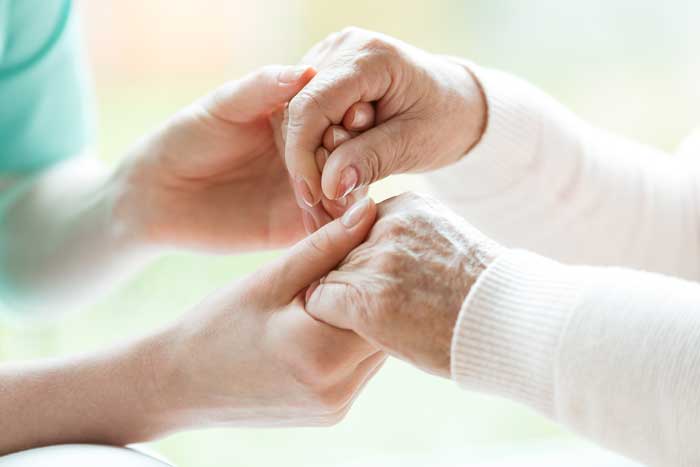Neurology
Neurology Treatment
Our experienced neurological team at Neurosleep & Pain Management Center in Fort Gratiot, MI, is skilled at handling many types of neurological conditions, from Parkinson’s disease to neuropathy. Read on to learn more about the types of neurological conditions and nervous system diseases we handle.

Parkinson’s Disease
Parkinson’s disease is an extremely diverse disorder that affects each person differently. This disease is a disorder of the central nervous system, which involves nerve cell damage in the brain. Symptoms include hand tremors, slow movement, stiffness, or loss of balance.
While there is no cure for Parkinson’s disease, meeting with a neurologist can help assess the state of your brain and provide treatment for symptoms of the disease. Our team at Neurosleep Center can work with you to develop a comprehensive treatment plan to improve your quality of life.

Headaches and Migraines
The three types of primary headaches are migraines, tension headaches, and cluster headaches. Migraines can last between a few hours and a few days, often leaving you unable to function normally during that period. Symptoms include intense throbbing pain, nausea or vomiting, sensitivity to lights or sound, visual reactions like flashing lights or zigzag lines, and tingling, cold, or numb limbs.
Studies show that migraines are more common among women, with headache episodes occurring more frequently during the perimenstrual period as a result of changes in estrogen hormone levels during the menstrual cycle. Premenstrual migraines occur during or after the time when the female hormones, estrogen and progesterone, decrease to their lowest levels.
Tension headaches are the most common type of primary headache, occurring in up to 90% of adults in their lifetime. The exact cause of tension headaches isn’t known, although factors like stress can contribute. Symptoms of tension headaches typically include pain that feels like a tight band around the head and mild or dull pain that’s steady instead of pulsing.
Cluster headaches are very rare and are more common among men in their late 20s. These headaches typically wake patients from sleep around the same time each night, with pain always occurring on the same side, usually over one eye.
With neurological treatment, our team and migraine doctor at the Neurosleep & Pain Management Center in Fort Gratiot, MI, may be able to help you get relief from migraines and severe headaches.
Epilepsy and Seizures
A seizure is a sudden, uncontrolled electrical disturbance in the brain, causing changes in your behavior, movements, or feelings. Sometimes seizures involve simply staring blankly for a few seconds, while others lead to uncontrollable twitching of the arms and legs.
If you have two or more seizures or recurrent seizures, you may have epilepsy. Epilepsy is a central nervous system disorder in which brain activity becomes abnormal, causing seizures.
To diagnose your condition, our team at Neurosleep & Pain Management Center may use an electroencephalogram, or EEG, to record the electrical activity of your brain. We have a range of treatment options available, including medications, surgery, or other treatments.
Neuropathy
Peripheral neuropathy is a result of damage to your peripheral nerves. Neuropathy often causes weakness, numbness, or pain, typically in your hands and feet. This condition is usually the result of traumatic injuries, infections, metabolic problems, inherited causes, or exposure to toxins. The exact type of pain can vary, depending on which nerves are affected in which parts of your body, but common symptoms include tingling, numbness, sensitivity to touch, or lack of coordination and movement.
At Neurosleep & Pain Management Center in Fort Gratiot, MI, we can diagnose whether you’re dealing with peripheral neuropathy and determine the best course of treatment for your condition.
Fibromyalgia
Fibromyalgia is a disorder characterized by widespread musculoskeletal pain accompanied by fatigue, sleep, memory, and mood issues. Researchers believe that fibromyalgia amplifies painful sensations by affecting the way your brain processes pain signals. Symptoms of fibromyalgia sometimes begin after a physical trauma, surgery, infection, or significant psychological stress.
Treatment can ease your symptoms, providing pain relief and better sleep while allowing you to function better in daily life.
Multiple Sclerosis
Multiple sclerosis (MS) is an unpredictable and often disabling disease of the central nervous system that disrupts the flow of information within the brain and between the brain and body. The cause of MS is still unknown and little can be predicted about the advance of the disease in an individual, but that doesn’t mean you can’t seek treatment.
Meeting with a neurologist, a doctor who specializes in the brain, can help with developing an individualized treatment plan for MS. Treatment plans may include seeking care from occupational therapists, speech therapists, physical therapists, or others to combat the symptoms of MS.
Testing
An EEG (electroencephalogram) can determine changes in brain activity that may be useful in diagnosing brain disorders, especially epilepsy. An EEG may be helpful for diagnosing or treating the following disorders:
- Epilepsy or other seizure disorder
- Brain tumor
- Head injury
- Brain dysfunction that may have a variety of causes (encephalopathy)
- Inflammation of the brain (encephalitis)
- Stroke
- Sleep disorders
- Dementia
EMG (Electromyography) is a diagnostic procedure to assess the health of muscles and the nerve cells that control them (motor neurons). Your doctor may order an EMG if you have signs or symptoms that may indicate a nerve or muscle disorder. Such symptoms may include:
- Tingling
- Numbness
- Muscle weakness
- Muscle pain or cramping
- Certain types of limb pain
EMG results can reveal nerve dysfunction, muscle dysfunction or problems with nerve-to-muscle signal transmission. EMG results are often necessary to help diagnose or rule out a number of conditions such as:
- Muscle disorders, such as muscular dystrophy or polymyositis
- Diseases affecting the connection between the nerve and the muscle, such as myasthenia gravis
- Disorders of nerves outside the spinal cord (peripheral nerves), such as carpal tunnel syndrome or peripheral neuropathies
- Disorders that affect the motor neurons in the brain or spinal cord, such as amyotrophic lateral sclerosis or polio
- Disorders that affect the nerve root, such as a herniated disk in the spine
Trigger point injection (TPI) may be an option for treating pain in some patients. TPI is a procedure used to treat painful areas of muscle that contain trigger points, or knots of muscle that form when muscles do not relax. Many times, such knots can be felt under the skin. The procedure can also help break up the knot and relieve spasms and the feeling of tightness. This will make you feel better and make it easier for you to move and exercise.
Occipital nerve block is a therapeutic procedure used to treat pain originating at the back of the head. It is performed through injection of steroids and a local anesthetic into the base of the skull, where the occipital nerves are located. The steroid injected reduces the inflammation and swelling of tissue around the occipital nerves. This may in turn reduce pain, and other symptoms caused by inflammation or irritation of the nerves and surrounding structures. GONB is used to treat the following:
- Headaches over the back of the head
- Tension headaches
- Cluster Headaches
- Nerve inflammation/Painful scalp
- Migraine headaches, may respond to occipital nerve blocks.
